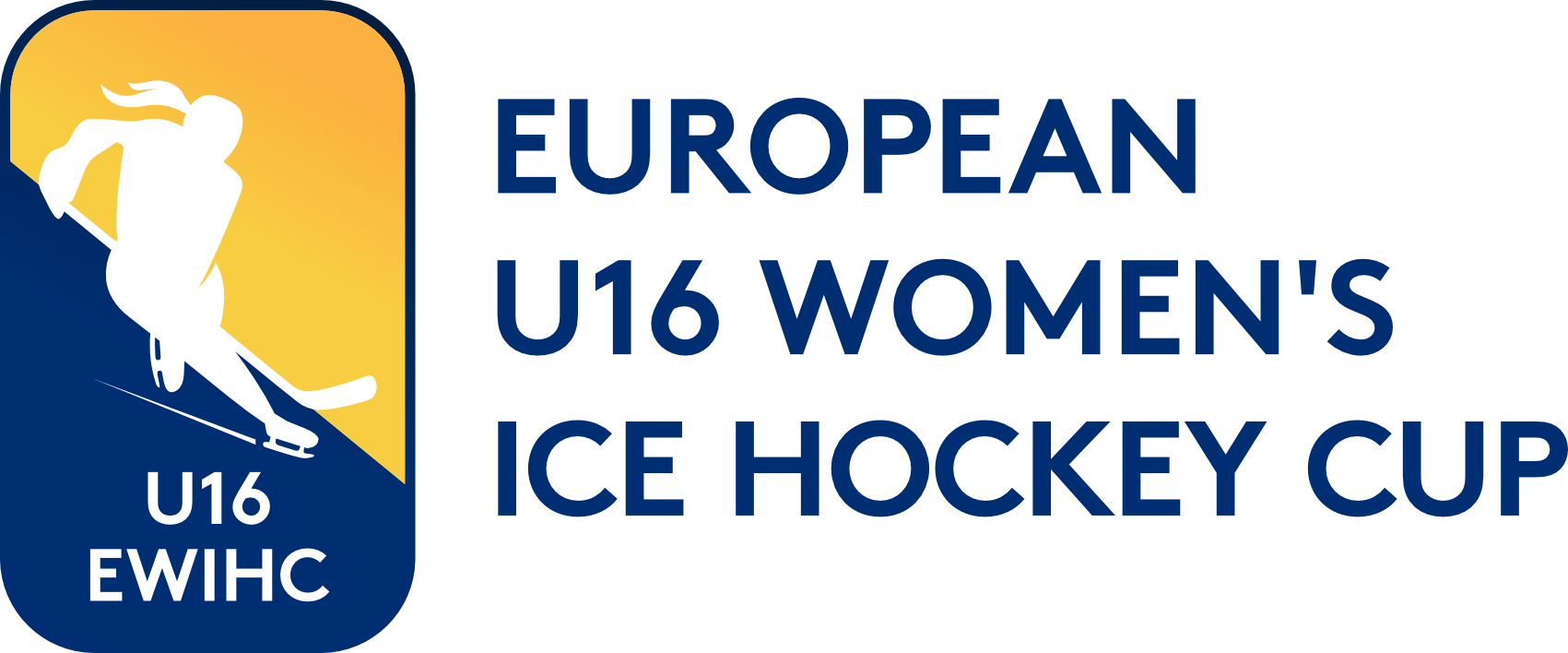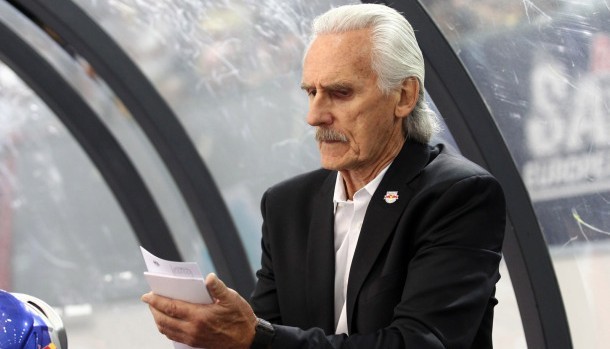
During the Olympic Qualifying Tournament there was a white haired gentleman that was on the end of the Lithuanian bench. At first thought he might have been a legendary Soviet coach who might have been working with the Lithuanian federation since the breakup of the USSR. This person was none other than George Kingston a Canadian who is a true professional of the game who has seen possible everything a coach could see and then some.
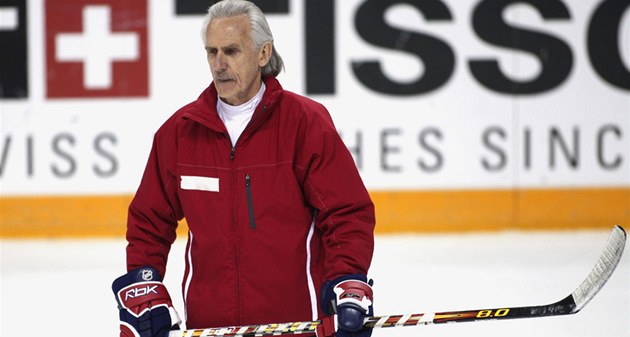
If you asked the average fan to name the coach at last month's Olympic Qualifying that has coached at the highest level odds are the first name mentioned would have been Hungarian national team coach Rich Chernomaz or maybe goalie coach Gary Clark. They would be wrong, both were in charge of teams in the DEL. George Kingston has ridiculous coaching resume not to mention that he is still behind the bench at the age of 76. He has couched at the college level and in three professional leagues, he has worked with the national team’s of five different countries. He had been an assistant coach with a number of NHL teams, the first head coach of the San Jose Sharks as well as being the head coach of Canadian, Norwegian and German national teams and a world champion.
Coaching non traditional hockey nations
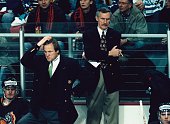
The first question that might come to mind is what is a former NHL and team Canada head coach doing on the Lithuanian bench? Like most answers to a simple question George Kingston gives an answer that shows why he loves this game. “First off I met Bernd Haake (Lithuanian head coach) in 1975, we are very good friends and he asked me to help out if I would. They had a great learning opportunity from this tournament and I hope that some of the ideas that I gave them will help them become great hockey players
Short playing career, long coaching careerindividually and better hockey players to be successful on the ice.” Despite Lithuanian not being a current hockey nation Kingston has worked with an even more of a peculiar national team program as well, where he was also an assistant on the national team staff for Mexico. “You have to first see that I have worked in non traditional hockey cities in the U.S., I worked in San Jose, Atlanta, in south Florida. When there are players who travel two hours to get to the federation office and from their they travel two hours to the rink where they train for an hour and a half and travel back four hours, that shows that they are dedicated to the sport and they love it, why wouldn't a couch want to work with athletes that give so much dedication to the game.”
“I grew up on a farm in Saskatchewan and we learned to play hockey on frozen slues and ponds, I later played junior hockey and the Detroit Red Wings owned my playing rights, this was before the draft existed. My grandparents told me I had to get an education and move off the farm. I had to pick between playing junior hockey or school and I knew my family would absolutely kill me so I played lower level junior hockey and then went off to play at the University of Alberta” In today's world most people would look inamazement that someone would pass up a chance at playing a high level of junior hockey or a shot at the NHL to go to college, however at the time only the top stars made enough to live off of a pay check. A university degree looked more lucrative career choice in the late 1950s. “I had scholarships from the U.S. but I had two former teachers coaching at Alberta, I had pro contract offers out of college but decided to play senior hockey, and when the NHL expanded in 1967 the St.Louis Blues offered me chance to try out for them, but by then I had enough injuries and I had a job offer to teach and be the head coach of the University of Calgary.” Kingston took over as head coach of the University of Calgary in 1968 and held that position for just about twenty season, he also had a number of other side projects “I worked for Hockey Canada and the Canadian Olympic team from 1979, later I was an assistant coach for the Calgary Flames when they moved up from Atlanta. In 1971 I went out to the Soviet Union to study right before the Summit Series, I studied in Czechoslovakia Finland and Sweden getting advanced degrees. The bottom line is I could have turned to pro coaching as early as 1972 working for my good friend Scotty Bowman.”

Experiencing the Soviet Union
As a true student of the game and a natural thirst for knowledge Kingston as he mentioned before travelled throughout Europe to learn more about hockey, he was very intrigued by the Soviet style and when he had a chance to travel to the Soviet Union a year before the famous Summit Series and learn from Anatoli Tarasov he jumped at it. “I had been with an All Star team that played against a Russian team and I liked their style, it was more attacking and I thought it would be nice to study there. I am not just a defensive coach or an offensive coach but a total coach who believes in offense however you need to get the puck somehow and also you need to work to get it back, you need to be able to understand both sides of the game. I called the Summit Series to be even, the gamesmanship to be in favor of Canada, but the conditioning level and surprise factor to the Russians, because I didn't think our players and hockey people would give the Soviet Union the respect. I was able to watch the Soviet training sessions during the fall of 1971 and became friends with Tarasov I respected his work. He was a wonderful person with great humor and a true love for the game. Tarasov took Lloyd A. Percival's book, ‘The Hockey Handbook’ and he learned from it more than us Canadians did.”
The NHL and Pierre Page
George Kingston has been friends with the controversial Pierre Page for many years as they had worked together with the 1980 Canadian Olympic team and both were on the coaching staff of the Flames. When Page took over as the head coach of the Minnesota North Stars he named Kingston as one of his assistants. “Pierre really wanted to establish a name for himself, he is a fiery frenchman and that fire can be positively channelled but people sometimes see the negative fire because he so wants to see the players win and succeed. I know there were some problems in Münich and Saltzberg, in terms how hard he went after players. He was demanding excellence, he was demanding that you become a better person and a better player.” Kingston would leave the North Stars to coach the Norwegian national team but was back in the show as the first head coach of the San Jose Sharks. “It was the most enjoyable experience until my general manager got backstabbed, towards the end of year one. After that our plans went down the toilet, I tried to get myself fired, but they wouldn't fire me because my face was on the season tickets that had been printed two months earlier. That's pro hockey and there was nothing that I could do. I knew that the two guys that had backstabbed Jack Ferreira (the GM) were going to get me. I could have picked up Teemu Selanne in a trade for Pat Falloon and Neil Wilkinson and when that didn’t go through I went to the team president and said fire me.” In the mid 1990s Kingston was active on the international scene as he coached Canada at one and Germany at four world championships and was the general manager of the 1994 Canadian Olympic team, before going back to the NHL where he was an assistant with the Thrashers and Panthers. He reunited with his old buddy Page for the 2012-13 season as an assistant for Red Bull Salzburg.
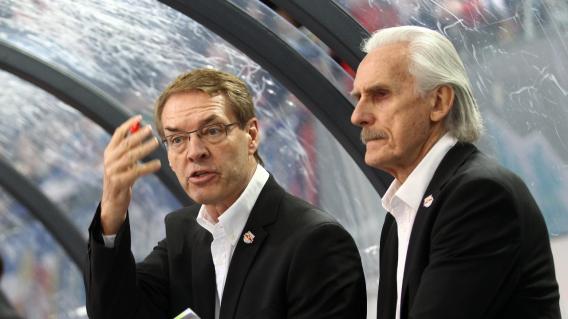
On paper the highlights of Kingston’s career is either winning the silver medal at the 1994 Winter Olympic Games, winning the 1994 World Championships with Canada or being an NHL head coach. For him personally it is probably the number of players he was able to pass on his hockey knowledge, regardless of if it was in the classroom, an NHL practice session or an ice rink in Norway and the positive influence he has had on so many people’s lives.
